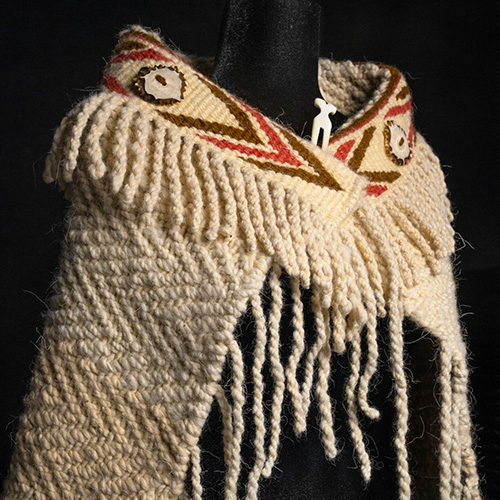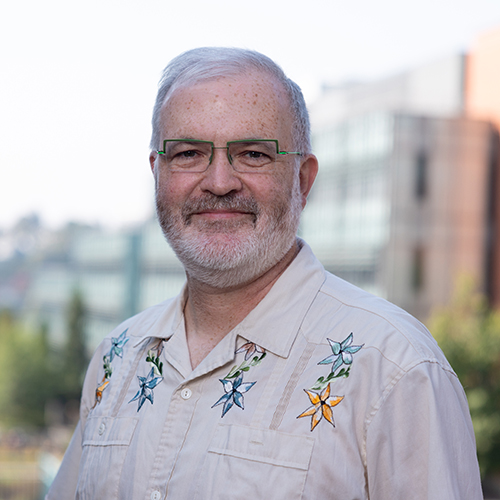A priest, a scientist, and a truck driver walk into a cocktail party….

Actually, they’re all scientists, with two of them assuming the role of priest and truck driver. And there are no cocktails.
The “cocktail party” is an exercise used in a graduate seminar course for scientists wanting to hone their communication skills. In the exercise, the graduate students spend three minutes describing their research to classmates who pose as non-scientists of various ages and backgrounds. Explaining gene therapy to the “banker” or “dog trainer”? Challenging. Explaining it to a “kindergartner”? Even more difficult.
“There’s been surprisingly little done to train scientists to speak to the public,” says Eric Hilton, a graduate student in astronomy, who co-led the seminar, Communicating Science to the Public Effectively, with Forest Resources graduate student Rachel Mitchell. “Scientists need to learn what’s appropriate for a general audience.”

Hilton and Mitchell, along with astronomy graduate student Phil Rosenfield, dreamed up the seminar course after participating in a book group where the books Unscientific America and Don’t Be Such a Scientist were discussed. The first book highlights the importance of introducing science into political discussions. The second focuses on how to make science engaging to non-scientists.
The three students organized a lecture series last spring as an opportunity for graduate students to present their research to the public, then planned a seminar course where they and their peers could polish their skills. “We did a lot of brainstorming, writing down all the skills you need to be a good speaker,” recalls Hilton. “Then we figured out how to draw upon the expertise of others for the course.”
Guest speakers included staff members from The Nature Conservancy, a representative from the Pacific Science Center, and a local science writer, all of whom engage the public in science. Also presenting were graduate students with experience in public speaking, acting, and improvisation. In fact, the very first class session was a nearly two-hour improv activity—very much a fish-out-of-water situation for most of the 11 graduate students and 2 postdoctoral students taking the class.
“We saw it as an icebreaker. We figured it would scare away anyone who wouldn’t be open to the course,” says Mitchell. “The students were perhaps a bit skeptical about how relevant the improv work would be, but everybody was willing.”

That’s a good thing, because the class returned to improvisation exercises frequently during the quarter. It turns out improv is excellent preparation for a science talk. “It’s about thinking on your feet and not getting stuck when people ask something you weren’t expecting,” explains Mitchell. “It makes you more nimble.”
Storytelling was another key seminar topic. As Randy Olson explains in Don’t be Such a Scientist, stories are what engage people. The challenge is to find a way to present science research as a story that grabs the audience. To deconstruct storytelling, the students were asked to watch a television show or movie and identify its three-act structure. They also listened to RadioLab, a National Public Radio program that spends an hour on a scientific topic. “The show starts with vignettes—anecdotal stories—and then brings in scientists to discuss them in context,” says Hilton. “It’s a powerful example of what works.”
Once students developed their research “story,” they had multiple opportunities to present it. First they took turns as the scientist at that memorable mock cocktail party. Then they presented three minutes of a more formal talk, with their classmates serving as audience and sounding board.
“With such a small group, class discussion was a powerful resource,” says Mitchell. “We asked each other, ‘Is it working? What would be better?’ Critiquing can sometimes be uncomfortable, but it wasn’t in this situation.”
Now that the course has ended, the students are preparing 30-minute talks for Engage: The Science Speaker Series, an upcoming lecture series for the general public. Asked whether the students are ready for prime time, Mitchell and Hilton smile.

“The first day of class, we went around the room to introduce ourselves and describe our research,” recalls Mitchell. “I couldn’t understand what people were talking about. But now….” Hilton finishes her thought. “Watching them give talks at the end of the quarter, it was like watching kids graduate,” he says. “They did so well, putting it all together. You could tell that they’d incorporated what they’d learned.”
Neala Kendall, a graduate student in the School of Aquatic and Fishery Sciences, had the opportunity for a test run when she presented her research at her departmental Graduate Student Symposium. At the end of the symposium, she won the “best talk” award.
“I thought up front about how to frame my talk differently,” says Kendall. “It was more of a story and I tried to build some tension so the audience would want to know how it was resolved. I definitely think that the seminar course helped me improve my presentation."
More Stories

A Healing Heart Returns
In February, the UW Symphony will perform a symphony that Coast Salish elder Vi Hilbert commissioned years ago to heal the world after the heartbreak of 9/11. The symphony was first performed by the Seattle Symphony in 2006.

Coast Salish Traditions are "Woven in Wool" at the Burke
A Burke Museum exhibit, co-curated by Coast Salish weavers and Burke curators, highlights the importance of weaving to Coast Salish communities.

Demystifying Quantum
In a physics course for non-STEM majors, Professor Miguel Morales teaches quantum mechanics without the advanced mathematics most quantum courses require.